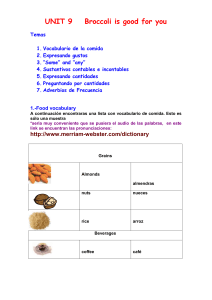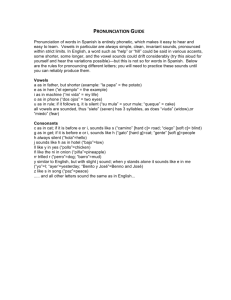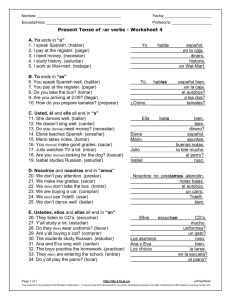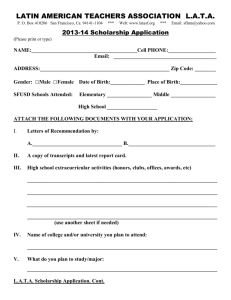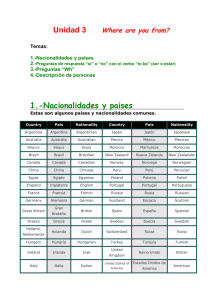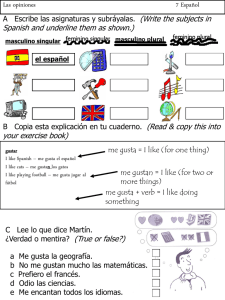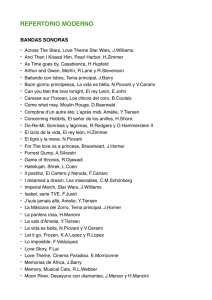Unidad 9
advertisement
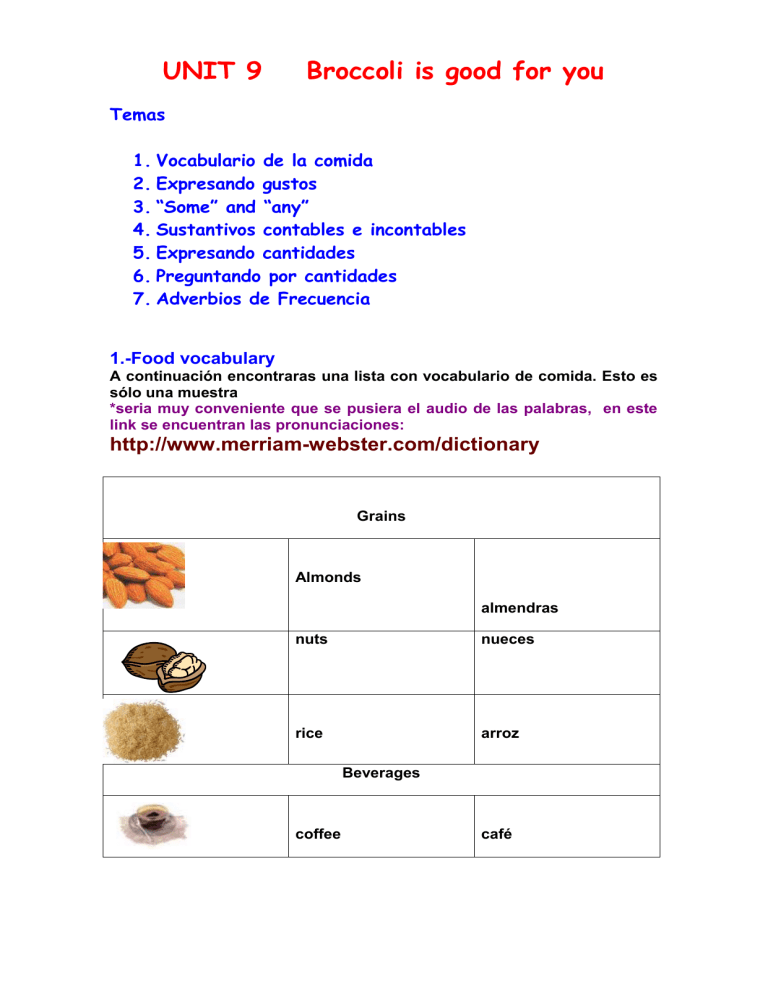
UNIT 9 Broccoli is good for you Temas 1. Vocabulario de la comida 2. Expresando gustos 3. “Some” and “any” 4. Sustantivos contables e incontables 5. Expresando cantidades 6. Preguntando por cantidades 7. Adverbios de Frecuencia 1.-Food vocabulary A continuación encontraras una lista con vocabulario de comida. Esto es sólo una muestra *seria muy conveniente que se pusiera el audio de las palabras, en este link se encuentran las pronunciaciones: http://www.merriam-webster.com/dictionary Grains Almonds almendras nuts nueces rice arroz Beverages coffee café milk Leche Hot chocolate chocolate tea té Fruits apple manzana pineapple piña peach durazno mango mango strawberry fresa Melon / cantaloupe melón pear pera banana platano blackberry mora watermelon sandía Beverages coffee café water agua Hot chocolate Chocolate caliente tea Te Vegetables cucumber pepino lettuce lechuga carrot Zanahoria tomatoe Tomate celery Apio Potatoe papa Hot pepper chile onion Cebolla artichoke alcachofa Meat, fish and Poultry fish pescado sausage Salchicha / chorizo ham Jamon Meat / beef Carne chicken pollo Dairy products Butter Mantequilla Eggs Huevos yogurt Yogurt cream Crema milk leche Activity 1.-. Haz una lista de comida que te guste y otra de la que no te guste I like…………….. I don’t like…………. En estos links encontraras vocabulario y algunos ejercicios sobre comida para que practiques lo que aprendiste en esta unidad http://www.languageguide.org/im/food/eng/ http://www.languageguide.org/english/grammar/esp/part4/cook.jsp http://esl.about.com/library/vocabulary/blwordgroups_food.htm http://www.umass.edu/umext/nutrition/resources/library/download/fnp/acti vity_sheets/Fun_with_Fruits.pdf http://www.eflnet.com/vocab/food_vocabulary.php http://www.eslgold.net/vocabulary/food.html http://www.languageguide.org/english/grammar/esp/part2/food.jsp http://www.languageguide.org/im/fruits/eng/ http://www.languageguide.org/im/veg/eng/ http://www.languageguide.org/im/food/eng/ http://www.languageguide.org/im/food/eng/index2.jsp 2.-Expresando gustos Aprenderás a expresar lo que te gusta o no te gusta usando el verbo like y don’t like. Explicación En inglés si deseas expresar: Me gustan las manzanas debes hacerlo de la siguiente manera Español Inglès Me gustan las manzanas. I like apples. A é le gustan las naranjas. He likes oranges. A ella le gusta la leche. She likes milk. A ellos le gusta el refresco. They like soda. Me gusta el pollo. I like chicken. Como te darás cuenta para expresar que algo te gusta es necesario que uses el verbo Like. Por el contrario si no te gusta algo lo puedes expresar usando el auxiliar don’t o doesn’t (en caso de he, she, it) y la palabra like Ejemplo: I don’t like milk. Español Inglés No me gusta la leche. I don’t milk. A ella no le gusta la hamburguesa. She doesn’t like hamburgers. A él no le gusta el tomate. He doesn’t like tomatoes. A Uds. no les gusta la lechuga. You don’t like lettuce. A ellos no les gustan las zanahorias They don’t like carrots Activity 2.- Realiza el siguiente ejercicio. Escribe la letra que corresponda a la frase. (a) (b) (c) (d) 1. ( ) I like to eat ice-cream after I play baseball. 2. ( ) Cake is my favorite food. I like it a lot. 3. ( ) Apples are delicious. I like to eat an apple for breakfast. 4. ( ) I like to eat out on weekends. (a) (b) (c) 5. ( ) I don’t like drinking beer for breakfast. 6. ( ) Milk is not my favorite drink. I don’t milk. 7. ( ) I’m vegetarian. I don’t like eating meat. 8. ( ) I like meat a lot but I don’t like eating vegetables (d) Links para practicar el tema http://www.uv.mx/tecaprendizaje/material/cursoenlinea/grammar/english grammartwo/like+ing/like%20and%20ing/like__and_dislikes.htm http://www.staff.vu.edu.au/fnSAC/likes/index.htm http://www.languageguide.org/english/grammar/esp/part4/cook.jsp http://www.btinternet.com/~ted.power/elm02.html 3.-“Some” and “any” Explicación: En español SOME se usa cuando quieres expresar una cantidad indefinida cuando hables de alimentos o bebidas. Su significado puede ser algo de, algunos (as), un poco de. Generalmente se usa en oraciones afirmativas y puede usarse tanto para sustantivos contables como incontables. Ejemplo: SOME Sustantivos contables Sustantivos incontables I have some pencils. He wants some water. He eats some bananas. He wants some lemon tea. She has some cups. I have some honey. En estos ejemplos notarás que las palabras subrayadas son los sustantivos incontables y contables. Any también expresa una cantidad indefinida. Su significado puede ser algunos (as), nada, ninguno, dependiendo del contexto del enunciado o frase. A diferencia de some, ANY se usa es oraciones negativas e interrogativas y puede usarse también para sustantivos contables como incontables. Ejemplo: ANY Sustantivos contables (negativo) Sustantivos incontables (interrogativo) She doesn’t need any eggs. Does she have any sugar? He doesn’t have any oranges. Do you need any oil? I don’t have any money. Do you want any milk? Activity 3.- Escribe “some” or “any” 1. We need _______ potatoes for the potato salad. 2. Is there _______ mayonnaise at home? 3. I don't want _______ broccoli in the salad. I hate it !!! 4. We need _________ rice today. We don’t have ____ in the cabinet. 5. There are ______ apples in the refrigerator. 6. There isn't _________ bread. Please go and buy some En los enlaces siguientes vas a encontrar más información y ejercicios que puedes realizar sobre este tema. http://esl.about.com/library/quiz/blgrquiz_quantity1.htm http://www.languageguide.org/english/grammar/esp/part2/quantity.jsp http://www.english-4u.de/some_any_ex1.htm http://www.englischhilfen.de/en/exercises/confusing_words/some_any.htm http://www.edufind.com/english/grammar/Determiners7c.cfm http://web2.uvcs.uvic.ca/elc/studyzone/200/grammar/somany.htm http://www.english-test.net/esl/learn/english/grammar/ei099/esl-test.php http://a4esl.org/q/h/0001/jb-someany.html 4.Sustantivos contables e incontables Explicación: En inglés existen dos tipos de sustantivos: los contables y los incontables. Los sustantivos contables como su nombre lo indica son aquellos que se pueden contar. Es decir se pueden escribir en singular o plural ( a car, two cars, three cars, etc.) Ejemplo de sustantivos contables a banana some bananas One orange Two oranges One house Two houses One window Two windows One pencil Two pencils One cup Two cups Los sustantivos incontables son aquellos que no se pueden contar, es decir que no se pueden pluralizar, sólo se usan en singular. No se puede decir: two lemonades three waters para pluralizarlos se usa en su lugar some, much o a lot of. Además ten mucho cuidado en NO usar a o an con un sustantivo incontable a coffee a bread a chocolate Ejemplo de sustantivos incontables Ejemplo de sustantivos incontables Coffee sugar money water bread cheese Activity 4 Realiza el siguiente ejercicio. Marca en la columna que corresponda. Si tienes dudas revisa tus notas de gramática. Sustantivos Chicken A cup of coffee Coffee Cheeseburger cookies Sándwich Cereal Water Pear Cofee cream butter Banana Oil Celery Grapes Ham Salad Soup Rice eggs Contable Incontable En los enlaces siguientes vas a encontrar más información y ejercicios que puedes realizar sobre este tema. http://www.ompersonal.com.ar/ELEMENTARY/unit11/page2.htm http://www.1-language.com/englishcourse/unit9_grammar_exs.htm http://www.languageguide.org/english/grammar/esp/part2/non_count.jsp http://www.englisch-hilfen.de/en/grammar/nouns_uncountables.htm http://www.englischhilfen.de/en/exercises/nouns_articles/uncountable_nouns.htm http://www.csuchico.edu/~gthurgood/222/222%20pdfs%20copy/Ch%2012 _countables.pdf 5.Expresando cantidades A lot of, much, many Explicación Se usa a lot of con sustantivos contables o incontables y se puede utilizar en enunciados afirmativos, negativos e interrogativos. Su significado puede es: “un montón de” Se usa much sólo con sustantivos incontables y puede usarse en los enunciados interrogativos y negativos. En español equivale a mucho, mucha Se usa many con sustantivos contables y preferentemente es utilizado en enunciados interrogativos, negativos y afirmativos. Compara en el siguiente cuadro: A LOT OF MUCH MANY Un montón de Mucho - mucha Muchos - muchas Se usa con: Se usa con: Se usa con. -sustantivos contables -sustantivos incontables. -sustantivos contables -sustantivos incontables Se usa en enunciados Se usa en enunciados interrogativos y negativos afirmativos, negativos e En cualquier tipo de interrogativos: enunciados Ejemplo: Ejemplo: Ejemplo: - Do you eat much rice? -You have many pencils -We have a lot of books - She doesn’t have much money. -He doesn’t have many -They don’t have a lot of glasses sugar. - Do we need many boxes? - Do they have a lot of food? En los enlaces siguientes vas a encontrar ejercicios que puedes realizar sobre este tema. http://www.english-test.net/esl/learn/english/grammar/ei052/esl-test.php http://www.1-language.com/englishcourse/unit14_dialogues.htm http://www.inglesmadrid.com/ingles-online20c.htm http://www.skyline-english.com/PDFs/Grammar/2/U2Lesson2.pdf (únicamente página 13) 6.Preguntando por cantidades How much / how many Explicación: How many en español significa cuantos, cuantas. Se usa solamente para hacer preguntas con sustantivos contables. Ejemplo: How many cars are there in the parking lot? How many oranges do you need? How many glasses do you have? How much en español quiere decir cuanto, cuanta. Se usa para elaborar preguntas con sustantivos incontables: Ejemplo: How much flour do you need for the cake? How much sugar do you want? How much money do you have? Activity 5 Write “how much” or “how many” 1 2 3 4 5 6 7 8 9 10 11 12 13 14 15 16 17 18 19 20 We need some tea. ______ do we need? We need some eggs. ______ do we need? We need some paper. ______ do we need? We need some money. ______ do we need? ______ cigarettes do you smoke a day? ______ packets of cigarettes do you have? ______ butter do we have? ______ water do you drink per day? ______ hamburgers do you eat per week? ______ bedrooms are there in your house? ______ cream is there in the fridge? ______ trees are in your yard? ______ sugar do you take in your tea? ______ apples do you eat in an average week? ______ fruit do you eat in an average week? ______ real friends do you have? ______ chairs are there in your house? ______ furniture do you have? ______ juice do you drink in the morning? ______ tortillas do you eat per day? En los enlaces siguientes vas a encontrar ejercicios que puedes realizar sobre este tema. http://www.saberingles.com.ar/curso/lesson07/05.html http://www.better-english.com/easier/howmuch.htm http://www.inglesmadrid.com/ingles-how-much-22c.htm http://esl.about.com/library/beginner/blmuchmany.htm http://www.miguelmllop.com/practice/beginners/grammar/howmuchmany .htm http://a4esl.org/q/h/lb/how.html http://www.english-4u.de/how_much_many_ex1.htm 7.-Adverbios de Frecuencia Explicación: Los adverbios de frecuencias son: ADVERBIO ESPAÑOL Sometimes Algunas veces, a veces Usually generalmente Always Siempre Often A menudo, con frecuencia Never Nunca Ever Alguna vez Estos adverbios indican la frecuencia con que se realiza una acción y se colocan antes de un verbo. Ejemplo: I never get up early. Adverbio verbo She always have milk for breakfast. They sometimes have breakfast at school. We never eat fish in the morning. NOTA: Ten cuidado cuando uses el verbo To be, en este caso el adverbio de frecuencia lo colocarán después del verbo (is, am, are) Ejemplo: She is always late for school. They are often in the library. Exceptions: “Never", "seldom", "rarely " y otros adverbios de frecuencia y otros adverbios con sentido negativo no son generalmente utilizados en la forma negativa. Activity 6 Realiza el siguiente ejercicio. Coloca el adverbio de frecuencia en el lugar que le corresponda. Ejemplo: 0. Jenny have cereal for breakfast (often) Jenny often have cereal for breakfast 1. I get up early on Mondays. (always) ______________________________________ 2. My mother cooks fish for lunch. (never) ______________________________________ 3. Susan is late for work. (often) ______________________________________ 4. My father and my brothers go fishing. (never ) _______________________________________ 5. I am happy. (usually) _______________________________________ 6. Elena and Clara go to the movies. (sometimes) ________________________________________ En los enlaces siguientes vas a encontrar ejercicios que puedes realizar sobre este tema. http://www.learnenglish.org.uk/CET/flashactivities/frequency_adverbs_game01. html http://esl.about.com/library/grammar/blgr_adverbs_frequency.htm http://www.fortunecity.com/bally/durrus/153/gramex24.html#1 http://www.fortunecity.com/bally/durrus/153/gramex24.html#2 http://www.johnsesl.com/scrambledtxt/adverbs/ http://www.english-zone.com/verbs/freq-adv01.html http://www.wordpower.ws/grammar/gramex24.html#1 http://www.miguelmllop.com/practice/beginners/grammar/frequencyadverbs1.htm http://www.englisch-hilfen.de/en/exercises/adjectives_adverbs/adverbs_of_frequency.htm http://www.1-language.com/englishcourse/unit23_grammar_exs.htm http://www.1-language.com/englishcourse/unit23_grammar_exs2.htm http://wwwedu.ge.ch/cptic/prospective/projets/anglais/exercises/Frequency.htm http://wwwedu.ge.ch/cptic/prospective/projets/anglais/exercises/freq1.htm http://wwwedu.ge.ch/cptic/prospective/projets/anglais/exercises/freq3.htm http://www.oup.com/elt/global/products/headway/elementary/a_grammar/unit04/ hwy_elem_unit04_1/ Activity 7 Con que frecuencia realizas las siguientes actividades, elabora oraciones utilizando los adverbios de frecuencia y los verbos siguientes: Example : I always wake early on weekdays__ ___________________________________________________________________ ___________________________________________________________________ ___________________________________________________________________ ___________________________________________________________________ ___________________________________________________________________ ___________________________________________________________________ ___________________________________________________________________ ___________________________________________________________________ ___________________________________________________________________ ___________________________________________________________________ Activity 8 Coloca los siguientes adverbios de frecuencia en su orden correcto 1.__________ 2.__________ always occasionally sometimes hardly ever often usually 3.__________ 4.__________ 5.__________ 6.__________ never Activity 9 Elige la ubicación correcta del adverbio de frecuencia . Recuerda que siempre van después del verbo, excepto el verbo “to be” (am/are/is), en este caso van después del verbo. 1. What do you 2. I have am 3. Do you 4. I sick. (never) eat 9. My kids 10. We don't at my desk. (sometimes) eat rice for dinner? (ever) have eggs, bacon, and toast 7. In the winter it 8. She breakfast at work? (ever) have breakfast 5. Do you 6. I for breakfast? (usually) is isn't on Sundays. (always) very cold here. (often) home in the evenings. (usually) are have rice late for school. (seldom) at home. (often Activity 10 Ordene las palabras para formar las oraciones. Respeta las mayúsculas, minúsculas y signos de puntuación. 1.-Monday I English on have classes always. _______________________________________________________________ 2.-Saturday I to cinema to never go the _______________________________________________________________ 3.- TV I morning watch usually in the. ______________________________________________________________ 4.-goes My theatre seldom brother to the. ______________________________________________________________ 5.-always lot You a study. ______________________________________________________________ 6.- gets Mary eight up usually at. ______________________________________________________________ 7.-reads often Lisa lots books of ______________________________________________________________ 8.- on John Sundays usually tennis plays. _____________________________________________________________________ Activity 11 Lee la conversación y contesta el cuestionario. Charles: What do we need for the ¿Qué necesitamos para el asado? barbecue? Anne: Well, we need hamburger meat Bueno, necesitamos carne de and hot dogs. hamburguesa y salchichas. Charles: We have some hamburger in the Tenemos algo de carne en el freezer, but we don't have any hot congelador pero no tenemos dogs. salchichas. Anne: Right, and there aren't any buns. De acuerdo, y no hay ningún bollo (panecillo). Charles: Do we need any soda? ¿Necesitamos gaseosas? Anne: Yes, we do. Let's buy some soda Sí. Compremos algunas gaseosas and some lemonade, too. y limonada también. Charles: All right. And how about some Muy bien. ¿Y qué te parece algo pasta salad? de ensalada de pasta? Anne: Great idea !! Everyone likes pasta ¡Gran idea! A todos les gusta la salad. ensalada de pasta Charles: Let's not forget dessert. No nos olvidemos del postre. Anne: Yeah. How about some fruit? Sí. ¿Qué te parece algo de fruta? Maybe mangoes and Quizás mangos strawberries. y frutillas (fresas). Charles: Hm. I don't really like fruit. Hmm. Realmente no me gusta la fruta. Anne: I know. Your favorite dessert is Lo sé. Tu postre favorito apple pie. es el pastel de manzana. Charles: Yes. Apple pie with ice cream !! Sí. ¡Pastel de manzana con helado! Anne: OK. So let's put apple pie and ice OK. Entonces anotemos pastel de cream on the shopping list. manzana y helado en la lista de compras Para escuchar esta conversación: http://www.ompersonal.com.ar/ELEMENTARY/unit11/page4.htm 1.-What foods do they want for the barbecue? 2.-What drinks do they want? 3.-What kind of salad do they want for the barbecue? 4.-Does Charles like fruits? 5.-What is Charles’ favorite dessert? Answer Key unit 9 Activity 1 Answers may vary (las respuestas pueden variar) Activity 2 1. 2. 3. 4. 5. 6. 7. 8. c d a b a d c b Activity 3 1. 2. 3. 4. 5. 6. We need SOME potatoes for the potato salad. Is there ANY mayonnaise at home? I don't want ANY broccoli in the salad. I hate it !!! We need SOME rice today. We don’t have ANY in the cabinet. There are SOME apples in the refrigerator There isn't ANY bread. Please go and buy some. Activity 4 Sustantivos Contable Chicken A cup of coffee Incontable Coffee Cheeseburger cookies Sándwich Cereal Water Pear Coffee cream butter Banana Oil Celery Grapes Ham Salad Soup Rice eggs Activity 5 1. How much 2. How many 3. How much 4. How much 5. How many 6. How many 7. How much 8. How much 9. How many 10. How many 11. How much 12. How many 13. How much 14. How many 15. How much 16. How many 17. How many 18. How much 19. How much 20. How many Activity 6 1. I always get up early on Mondays. 2. My mother never cooks fish for lunch. 3. Susan is often late for work 4. My father and my brothers never go fishing 5. I am usually happy 6. Elena and Clara sometimes go to the movies Activity 7 May vary (las respuestas pueden variar) Activity 8 1. always 2.usually 3. often 4. sometimes 5. occasionally 6. hardly ever Activity 9 1. What do you USUALLY have for breakfast? ¿Qué comes USUALMENTE para el desayuno? 2. I am NEVER sick. NUNCA me siento mal. 3. Do you EVER eat breakfast at work? ¿Tomas A VECES el desayuno en el trabajo? 4. I SOMETIMES have breakfast at my desk. ALGUNAS VECES tomo el desayuno en mi escritorio. 5. Do you EVER eat rice for dinner? ¿Comes A VECES arroz en la cena? 6. I ALWAYS have eggs, bacon, and toast on Sundays. SIEMPRE como huevos, tocino y tostadas los domingos. 7. In the winter it is OFTEN very cold here. En invierno hace A MENUDO mucho frío aquí. 8. She isn't USUALLY home in the evenings. Ella no está USUALMENTE en casa por las noches. 9. My kids are SELDOM late for school. Mis chicos RARAS VECES llegan tarde a la escuela. 10. We don't OFTEN have rice at home. No comemos A MENUDO arroz en casa. Activity 10 1. I always have English classes on Monday 2. I never go to the cinema on Saturday 3. I usually watch TV in the morning 4. My brother seldom goes to the theatre 5. You always study a lot 6. Mary usually gets up at eight 7. Lisa often reads lots of books 8. John usually plays tennis on Sundays Activity 11 1.-hot dogs and hamburgers 2.-sodas 3.-pasta salad 4.-No, he doesn’t 5.-Apple pie
